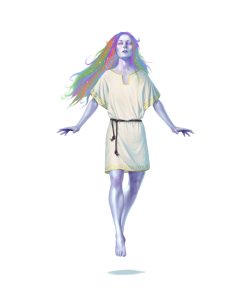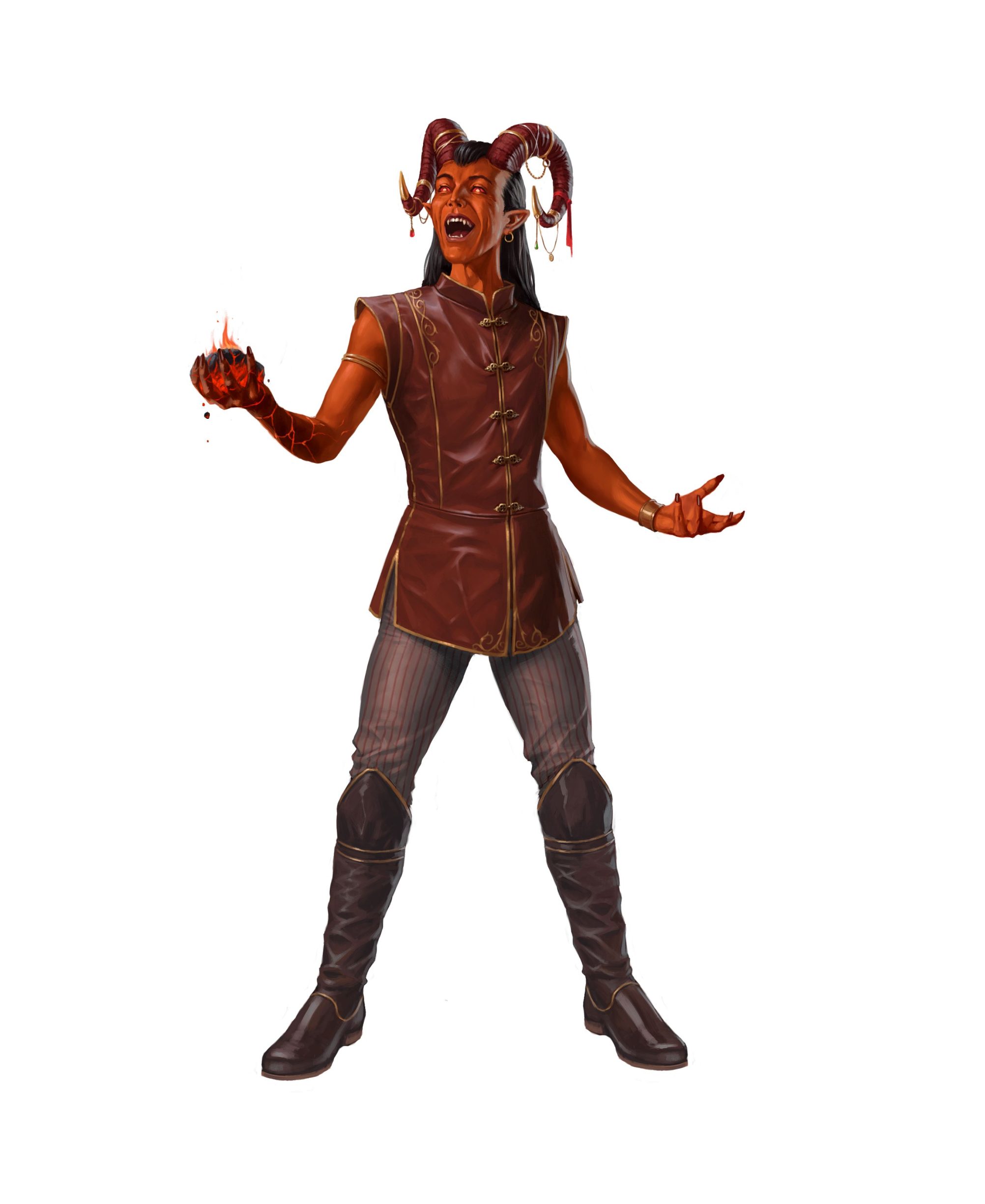
This is the seventh article looking at the lineages in the Tales of the Valiant game, not as fantasy stereotypes but as if they’re alien species similar to what you’d find in science fiction.
Your character’s lineage should be a cornerstone of deep roleplaying, not just a mechanism for gaining some bonuses you’d like to have. Elves, dwarves, smallfolk, and the crew aren’t just humans with pointy ears or lush beards.
Like everyone, you and me included, they are products of their culture, their upbringing, and their genes, which are very different from one lineage to another: one might even say alien. They don’t think, act, or view the world the way humans do—and that’s a fascinating roleplaying challenge.
Hear more from the Howling Tower!
The Assumptions
This article looks at sydereans with the typical, recommended heritage of anointed or vexed. These two heritages are strikingly different and yet intriguingly similar. We’ll deal with both on an equal footing, and where it matters, we’ll state explicitly whether we’re talking about one or the other. Some of what’s stated here won’t apply to sydereans with different heritages, and it might apply to other characters with the anointed or vexed heritage. In general, wherever we state “syderean,” we mean “typical anointed or vexed syderean.”
The traits ascribed to sydereans in this article aren’t exhaustive or universal. Devise your own cultural details for your character, using these as a guide. But make it different, thought-provoking, and most of all, a solid hook for a unique roleplaying experience. If you want to play your character like a human, play a human.
What Makes a Syderean?
Before diving in, what even is a syderean? The term may be unfamiliar but the concept is as old as superstition. It comes from the word sidereal, meaning “of the stars.” According to the Tales of the Valiant Player’s Guide, syderean characters are spawned by or spring from “creatures or powers from a different plane of existence. Sometimes called starborn or plane-touched, their origins are as varied and mysterious as the cosmic forces that shaped them.”
Sydereans are similar to changelings in that most are inserted into a mortal family without the parents’ knowledge or consent. Rather than having their own infant stolen and replaced with something else, the family’s infant is conceived as syderean or becomes syderean in the womb when a spirit or soul from another realm of existence merges with the fetus. There are exceptions—this is fantasy, where just about anything is possible—but that’s the general case.
Earth mythology is filled with characters who fit that description, such as Achilles, Perseus, Sigurd, Karna, Hanuman. In mythology, these figures typically have one mortal and one immortal parent. In the Tales of the Valiant game, a syderean’s origin is open-ended, for you to imagine.
The common thread running through all these stories is power bound up with destiny. If the idea of playing a character who is chained to an important but unknown and possibly inescapable destiny appeals to you, a syderean is the ideal choice.
The recommended heritage choices for sydereans are Anointed and Vexed. These are essentially opposite sides of a single supernatural origin coin. The Anointed side accepts or revels in the character’s origin and destiny, while the Vexed side rejects it or rebels against it. These extremes can overlap. A character might accept, even thrive on, the physical and psychological benefits of their otherworldly heritage while struggling against the burdensome destiny it places on them, or vice versa. Likewise, there’s no reason why celestial sydereans can’t reject their angelic ancestry or fiendish sydereans can’t welcome theirs. Those options are open-ended.
With all that said, what characteristics set sydereans apart from other lineages?
- There is no such thing as a syderean village or society. Sydereans are very rare (or should be). A syderean PC might live their entire life without ever meeting another syderean like themselves. Whether they’re hated or loved by their neighbors, they are always outsiders and misfits.
- Being marked as outsiders, sydereans are drawn to anonymity.
- A syderean birth doesn’t happen randomly or by chance. Every syderean brought into being has a purpose, a destiny it is meant to fulfill.
- Anointed accept their supernatural genesis and might (or might not) seek out their destiny. Vexed defy their origin or destiny, either hiding it or openly scorning it. But in no case can they ignore it.
Stranger in a Strange Land

Every syderean is an anomaly, a deviation from what “should have been.” Was an innocent mind effaced so the syderean’s otherworldly spirit could replace whatever personality was meant to inhabit this body? There’s no simple way for the syderean to know, but if so, that’s a heavy burden for a compassionate person to bear.
Most sydereans can’t hide their bizarreness. Inhuman skin tone, glowing eyes, hair that moves by itself, horns, wings, a tail . . . those aren’t just oddities, they’re shocking signs of inhumanity. We might be tempted to say, so what? In a world of fantasy, wouldn’t everyone know about sydereans and simply accept them like a hundred other weird things?
Maybe. But consider: if everyone knows about sydereans, then they know every syderean carries a destiny. And they probably know that mythological destinies are a curse more often than they’re a boon. No community wants a harbinger of doom hanging around. If sydereans aren’t common knowledge, then their physical traits and supernatural abilities are alarming. If they are common knowledge, they’re still alarming!
Here in the 21st century, we like to think we’re enlightened and multicultural. The farmers and herders of an isolated village with twenty families, one of whom just gave birth to a bright turquoise child with horns, a tail, and smoke-filled eyes, probably aren’t so well-educated and open-minded. That child will be considered an omen, good or bad. It might be welcomed as a blessing on the village. But it will always be the sky-child, the star-born, or the hell-blood, and never just “another one of us.”
I Want to Be Alone
Along with orcs, beastkin, and kobolds, sydereans face the additional stigma of being strangers in a world dominated by humans, elves, dwarves, and smallfolk (if that description fits your setting). That applies to all sydereans, not just those with fiendish origins. Celestials are less frightening to look at than fiends, but in a world where magic and the supernatural are real and dangerous, anything unfamiliar is a potential peril. The supernatural being who nurtures plentiful crops and healthy herds might also be the bringer of drought and famine if you upset them, so it’s best to tread lightly where such entities are concerned.
A syderean who’s fed up with being treated as an outsider has two options. The first is to blend into the multicultural, multi-lineage mélange of a large city. The second is to withdraw into isolation, far from other habitation. Bandits, outcasts, and exiles tend to welcome fellow misfits whoever they might be, so there’s a life of sorts out there. And of course, there’s the adventurer’s life of itinerant traveler, never staying in one place long enough to get thrown out.
Born(e) to Destiny
The intents and purposes of the beings responsible for the existence of sydereans in the mundane world are enigmatic. Why do these beings trigger the births of sydereans? Are they prohibited by natural or mystic law from interfering directly in our realm? Do they hope to engineer events or manipulate the future? They must have reasons, but they don’t share them with us—and even if they did, we might not understand them.
Eventually every syderean realizes they have a purpose, mission, or destiny that their extramundane “parents” want them to fulfill. Yet, despite their otherworldly nature, sydereans are also partially human. Part of them is linked forever to an alien reality, but the mortal world is home. Because of this, an individual syderean might not share the desires and goals of their progenitors.
Destiny is a heavy burden. Every syderean wrestles with the idea that the reason for their existence is to fulfill an agenda assigned by an unknown being. What can they do if that destiny conflicts with their human-taught values or threatens people they love? Science fiction uses that theme regularly in stories about androids and self-aware robots who wrestle with their dual identity as part machine, part human. It’s less common but no less intriguing in a fantasy context.
Now How Much Would You Pay?
Destiny can be embraced, it can be fulfilled unwillingly or unwittingly, or it can be thwarted. What destiny never does is work itself out without a cost. This is the #1 thing to understand about choosing to play a syderean. Your character comes with amazing abilities: vision that penetrates even magical darkness, resistance to necrotic damage, and wings for a celestial aspect or terrifying appearance and fire damage for a fiendish aspect. But eventually, your lineage will demand payment for that power, and the cost will be sky-high. You might be intended to topple a just kingdom, set loose an ancient evil, fulfill a demonic prophecy, trigger a righteous crusade that turns apocalyptic, or martyr yourself to bring about or forestall one of those events.
Work out the precise nature of your destiny with your GM. It needs to jibe with and amplify your hopes for the character as well as the GM’s plans for the campaign. Avoid fleshing it out in detail from the start, because sydereans themselves only learn their destiny over time. And the GM is justified in changing some aspects of what you agree to as events unfold.Your character is, after all, only one piece in a larger game of fate.
No matter what your syderean PC accomplishes, all the adventures they go on and treasures they seize are sideshows. The central conflict in your character’s life comes when their destiny becomes clear and they face the crisis of what to do about it. Regardless of whether you choose to fulfill or defy your destiny, you won’t walk away the victor. Your character was always a tool of fate. Tools are used, broken, and discarded.
Roleplaying Your Syderean
When roleplaying your syderean character, keep these principles in mind:
- Even in the midst of friends and companions, you are, ultimately, always alone. In all the world, there is no one else like you and no one else who understands what it’s like to be you.
- Even you don’t fully comprehend what it means to be you. Everyone wonders, “what is my purpose in life?” But the enigma at the core of that question is the cornerstone of your existence.
- Forces too large and alien for you to comprehend designed you to further their goals. You had no voice in those plans, but you do have a voice in whether and how you comply.
- When the cosmic forces using you as a pawn finally make their play, you might win the game for them or crush their strategy. You will not, however, come out on top. You are the means, not the goal.
A syderean PC may be the most difficult lineage of all to play well in a long campaign, but the reward is a roleplaying experience like no other.
Read more at this site
